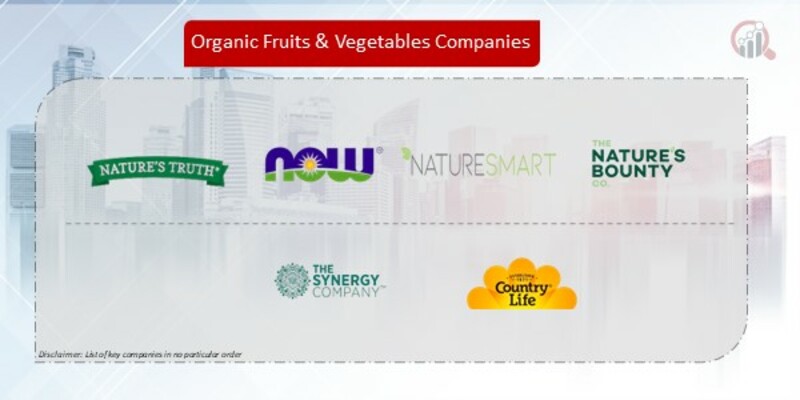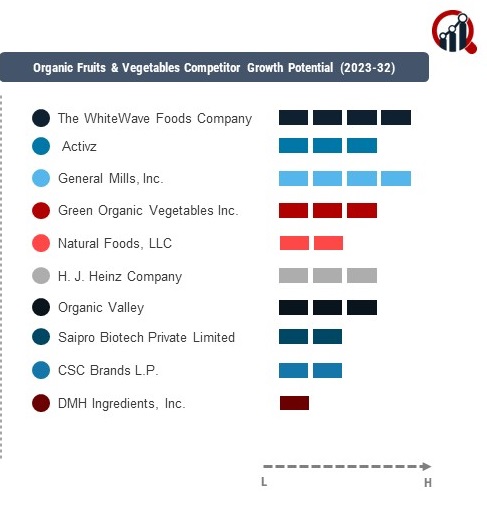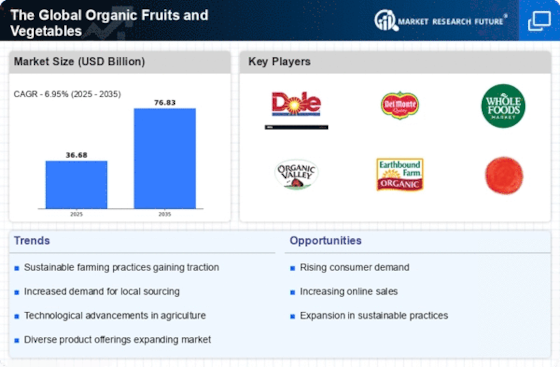Top Industry Leaders in the Organic Fruits & Vegetables Market

Strategies Adopted byOrganic Fruits Vegetables Key Players
The organic fruits and vegetables market has seen significant growth in recent years, driven by rising consumer awareness of health, environmental concerns, and sustainable farming practices. This market operates in a dynamic and competitive environment, with various key players and emerging companies shaping its landscape.
Key Players
- WhiteWave Foods Company
- Z Natural Foods
- LLC
- General Mills, Inc.
- Heinz Company
- Organic Valley
- Saipro Biotech Private Limited
- Green Organic Vegetables Inc.
- DMH Ingredients, Inc.
- Activz and CSC Brands L.P.
To maintain and increase their market share, these companies have adopted several strategies. These include mergers and acquisitions to expand their product range and geographical presence, investing in research and development for new product innovations, and enhancing supply chain efficiency. Furthermore, they focus on marketing and branding strategies to reinforce consumer loyalty and awareness of organic products.
Factors for Market Share Analysis
Market share analysis in this sector is influenced by various factors:
Product Quality and Variety: Consumers are increasingly discerning about the quality and range of organic products available.
Brand Reputation: Trusted brands with a history of quality products tend to dominate the market.
Distribution Channels: Effective distribution networks, including online channels, are crucial for market penetration.
Price Competitiveness: While organic products are generally priced higher, competitive pricing within this spectrum plays a role.
Certifications and Standards Compliance: Adherence to organic certifications and standards is key to gaining consumer trust.
New and Emerging Companies
Several new and emerging companies are making their mark in the organic fruits and vegetables market. These include Thrive Market, Inc., Green Chef Corporation, and Sprouts Farmers Market. They differentiate themselves through innovative business models, like subscription-based services, and a focus on local, freshly sourced products.
Industry News and Current Company Dynamics
The industry has seen various developments, with companies expanding into new geographical areas and investing in sustainable farming practices. There has been a notable increase in partnerships between organic food producers and retailers to enhance product accessibility. Additionally, technological advancements in organic farming techniques and supply chain management are being increasingly adopted.
Investment Trends
The organic fruits and vegetables market is witnessing a surge in investments, both from private equity and venture capital firms. These investments are primarily directed toward technology integration in organic farming, expansion of product lines, and scaling distribution networks. There is also a growing interest in sustainable and regenerative agricultural practices, which are seen as long-term investments.
Competitive Scenario
The overall competitive scenario is characterized by intense competition among established players and aggressive strategies by new entrants to carve out a niche. The market is also seeing increased collaboration between organic food producers and technology companies to enhance production efficiency and traceability.
Recent Developments
The organic fruits and vegetables market witnessed several key developments:
Technological Integration: There was a notable increase in the use of AI and IoT for precision farming in organic agriculture, aiming to boost yield and sustainability.
Expansion Strategies: Major players expanded their geographical footprint, particularly in emerging markets in Asia and Africa, where consumer awareness of organic products is growing.
Product Innovations: Companies launched a range of new products, focusing on organic exotic fruits and ready-to-eat vegetable segments.
Sustainability Initiatives: There was a heightened focus on sustainability, with companies investing in eco-friendly packaging and reducing carbon footprints.
Regulatory Developments: Governments worldwide introduced more stringent regulations and standards for organic farming, impacting market dynamics.












